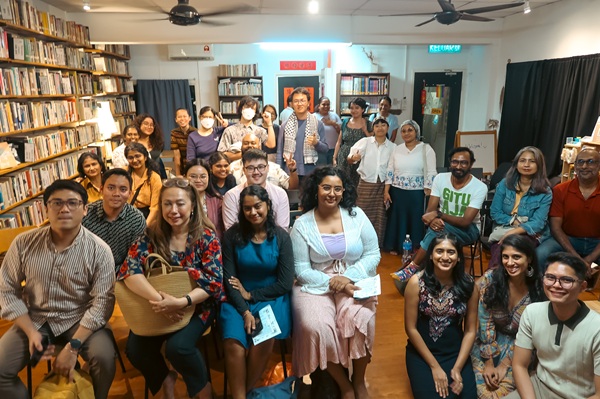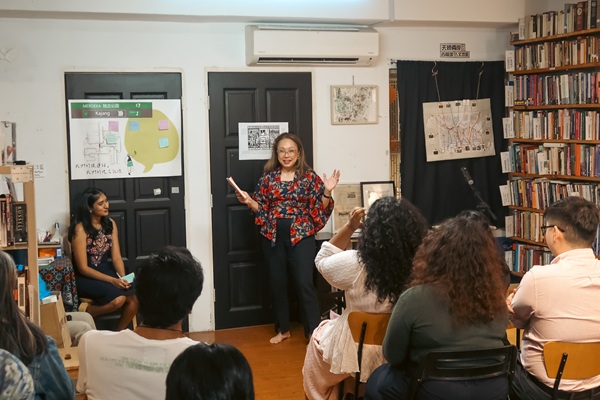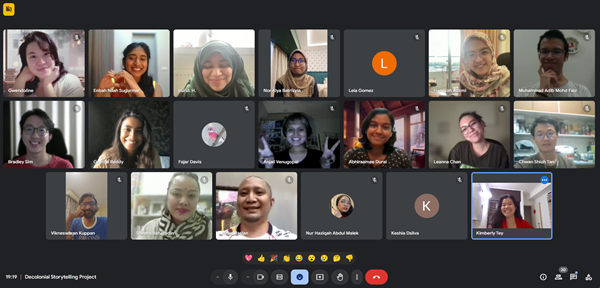BUSSIN Storytelling
The BUSSIN Storytelling Pilot aims to contribute a deeper decolonial understanding of racism by focusing on accounts of coloniality and decoloniality from Malaysia and Brazil. It is designed to facilitate knowledge exchange activities between co-researchers in the two countries to support capacity and solidarity-building praxis. The project will not only elicit creative works of resistance to coloniality by marginalised and diasporic communities, but also capture the resonances in experiences of coloniality between Malaysia and Brazil.
The anticipated outcomes from this pilot are an e-book by the end of 2025 with a collection of creative writings on decoloniality by participants from Malaysia and Brazil, and a report on storytelling as a decolonial method to co-develop knowledge on coloniality. The project is organised and led by two BUSSIN Collective members — Enbah Nilah Sugurmar (Malaysia) and Dr James Moura Jr (Brazil).
Malaysia
Enbah Nilah Sugurmar is the project manager of EXCAPE URMI. She also runs an intimate poetry open mic and writers’ circle called Words’ Worth in Kuala Lumpur. BUSSIN in collaboration with Words’ Worth organised a series of free workshops on the theme of decoloniality for Malaysian writers.
To introduce the project to the community of Malaysian writers, Words’ Worth ran a free workshop called “Brave New World(s)” for 11 writers on the 9th of December 2024. The theme was chosen as a resistance to the notion of “The New World” by European colonial explorers. In the colonial imagination, the new world and the idea of modernity itself are inextricably linked to an expansionist project whose only horizon is to find new lands to seize, new resources to plunder and new populations to displace and wipe out. Given the wide usage of the term “Brave New World” to signify a capitalist dystopia and colonial ambitions, the first workshop reimagined Brave New World (s) from a decolonial perspective. Such imaginings may envision futures that reject the singularity imposed by European colonization and embrace possibilities where many worlds and civilisations can co-exist and cohabit, worlds that have existed and persisted despite all that settler colonialism has done to destroy them, worlds we would like to exist in, in the not-so-distant future.
Some of the writers from this pilot workshop then participated in a poetry open mic at Rumah Attap Library on the 17th of December, hosted by Enbah Nilah and facilitated by Dr Keshia Dsilva. Dina Zaman, a renowned Malaysian writer and researcher, was a guest speaker at the event. She is also a co-founder of IMAN Research, a think tank focusing on socio-political and security matters, and a founding member of the Southeast Asian Women Peacebuilders.
Since then, the project has now grown to include 4 free workshops for nearly 20 participants.
The topics discussed are as follows:
- Coloniality of Being: The Formation of Race Categories and Hierarchies in Malaya (led by Dr Geetha Reddy) - 8 February 2025
- Coloniality of Being: Reclaiming Memory through Art and Annotations (led by Dr Nurul Huda Rashid) - 22 February 2025
- Coloniality of Gender(s) and Sexualities (led by Dr Keshia Dsilva) - 8 March 2025
- Coloniality of Knowledge Production and Dissemination (led by Dr James Ferreira Moura, Jr.) - 22 March 2025
Brazil
Group “Sowing Quilombola Wisdom with Nêgo Bispo”
The land gives, the land wants. Memory blossoms.
In 2024, the study group Sowing Quilombola Wisdom was held, inspired by the book The Land Gives, the Land Wants by Nêgo Bispo, at the University for International Integration of Afro-Brazilian Lusophony (UNILAB). With virtual gatherings held from August to December, the group brought together both Quilombola and non-Quilombola participants from across Brazil, in a collective experience dedicated to listening to, studying, and celebrating Quilombola knowledge through the work and life of the thinker Nêgo Bispo.
Over the course of three months, Quilombola facilitators led the sessions, deepening reflections on the book’s chapters in dialogue with community experiences, Black spiritualities, ecologies of knowledge, and practices of resistance. A particularly memorable moment was the session led by researcher Mateus Brito from Quilombo Lagoa de Maria Clemência (Bahia), who brought the chapter Cities and Cosmophobia for discussion, broadening the group's perspectives.
The closing in-person gathering took place at the Palmares II Courtyard at UNILAB, in a shared circle of food, affection, and solidarity contributions to the project Mucunzá com Literatura, which supports Quilombola literacy in various territories. The most symbolic moment of the group occurred on 5 December 2024, with the event Beginning-Middle-Beginning Soirée: in-Memoriam Letters to Nêgo Bispo — a free virtual gathering open to the public and part of the national programme honouring Bispo’s life and passage into enchantment.
Organised by Ana Eugênia, a Quilombola from Serra do Evaristo (Ceará), and researcher Amanda Veiga, the soirée featured cultural performances and the reading of original letters written by group participants, paying tribute to the memory and teachings of Nêgo Bispo. These letters will be compiled in the forthcoming e-book “Letters to Nêgo Bispo: Sowing Counter-Colonial Practices in Quilombola Knowledge”, scheduled for release in 2025.
As a living part of this journey, a graffiti mural was also created on the UNILAB campus, honouring Nêgo Bispo and Dona Socorro — a cultural master from the Serra do Evaristo Quilombo — as an artistic and political gesture of presence, ancestry, and reverence.
“We are peoples of pathways, not peoples of theory. We live by circularity: beginning, middle, beginning. Our lives have no end.”
— Nêgo Bispo (2023)
To find out more, follow the project on Instagram and the partner collective.
Long live, long live, Nêgo Bispo!


